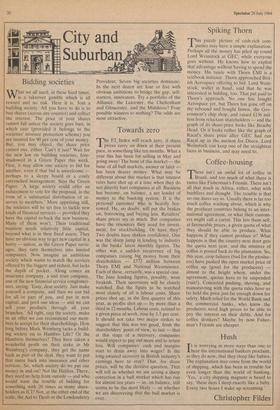Towards zero
The FT Index will reach zero, if share prices carry on down at their present pace, in something like ten months. What a year this has been for selling in May and going away! The bane of this market — the bane of all bull markets, sooner or later has been dearer money. What may be different about this market is that interest rates have shot up at a time when they do not directly hurt companies at all. Business has become, on balance, a net lender of money to the banking system. It is the personal customer who is heavily bor- rowed. He, no doubt, will put the brakes on, borrowing. and buying less. Retailers' share prices say as much. But companies have the resources they need for invest- ment, for stockbuilding. Or have they? Two doubts have shaken confidence. One was the sharp jump in lending to industry in the banks' latest monthly figures. The other was a sudden recurrence of big companies raising big money from their shareholders — £372 million between Thorn EMI and National Westminster. Each of these, certainly, was a special case. The June lending figures, possibly, were freakish. Their successors will be closely watched. But the figure to be watched most closely of all is labour costs. Share prices shot up, in the first quarter of this year, as profits shot up — by more than a third in 12 months. Labour costs, related to a given piece of work, rose by 3.5 per cent. It should not take two major strikes to suggest that this was too good, from the shareholders' point of view, to last — that at this stage of a recovery, companies would expect to pay out more and to retain less. Will companies' cash and margins start to drain away into wages? Is the long-awaited recovery in British industry's earnings here to stay? That, for share prices, will be the decisive question. That will tell us whether we are seeing a sharp correction in a hull market which has run for almost ten years — as, on balance, still seems to be the most likely — or whether we are discovering that the bull market is over.










































 Previous page
Previous page